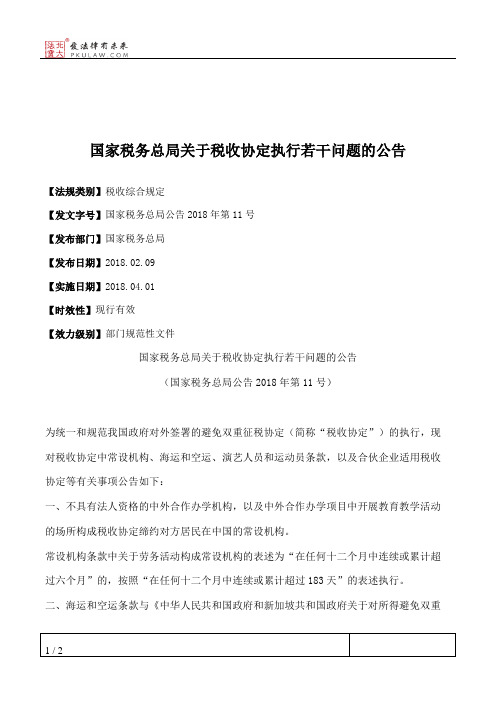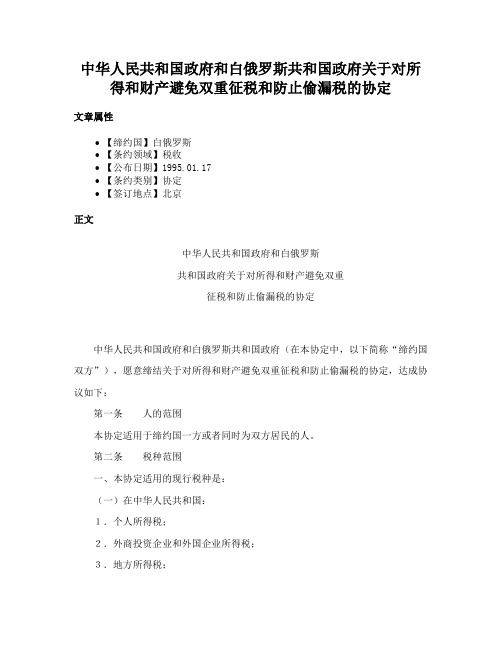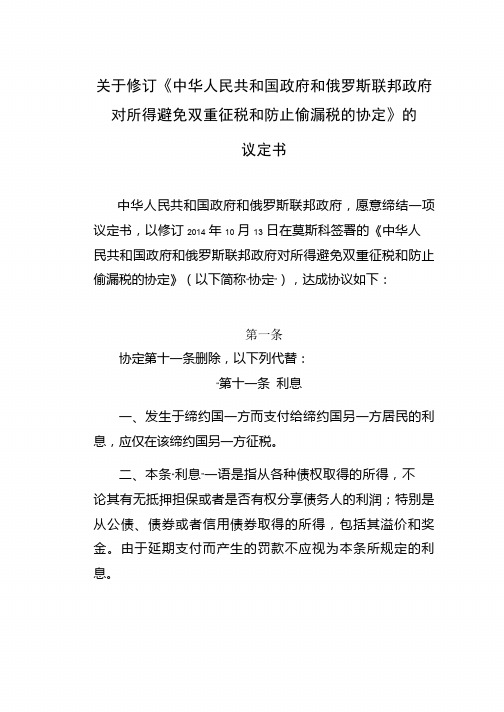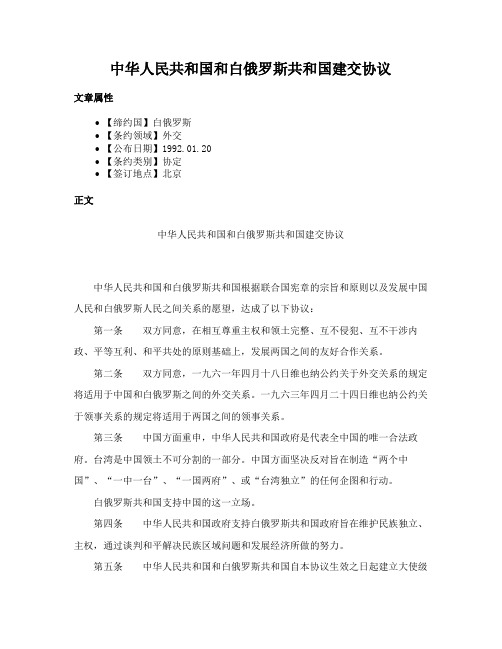国家税务总局关于印发《中华人民共和国政府和白俄罗斯共和国政府
中华人民共和国政府和白俄罗斯共和国政府联合公报

中华人民共和国政府和白俄罗斯共和国政府联合公报文章属性•【缔约国】白俄罗斯•【条约领域】刑事,商事,政治,外交•【公布日期】2024.08.23•【条约类别】联合公报•【签订地点】正文中华人民共和国政府和白俄罗斯共和国政府联合公报2024年8月22日至23日,应白俄罗斯共和国总理罗曼·亚历山德罗维奇·戈洛夫琴科邀请,中华人民共和国国务院总理李强对白俄罗斯共和国进行正式访问。
访问期间,李强总理分别同卢卡申科总统、戈洛夫琴科总理举行会见、会谈。
双方在诚挚友好气氛中就双边关系、各领域合作及共同关心的国际和地区问题深入交换意见,达成广泛共识。
一、双方高度评价中白全天候全面战略伙伴关系及两国各领域合作成果,一致认为在两国元首战略引领下,中白关系高水平运行,务实合作稳步推进,国际协作富有成效。
双方重申,将以两国元首共识为根本遵循,密切高层交往,扩大互利合作,实现共同发展与繁荣。
双方决定,到2030年,两国政府的中期核心任务是分享借鉴中国现代化建设的经验和成果,协作发展新质生产力。
白方在中方支持下推进科技创新,拓展新的工业领域并推进现有产业现代化,遵循生态优先和绿色发展理念,适应世界生产关系新趋势。
二、双方将继续在涉及彼此核心利益问题上相互支持,坚决反对外部势力以任何借口干涉别国内政,坚决反对在民主和人权问题上搞双重标准。
白方重申坚定奉行一个中国原则,承认世界上只有一个中国,台湾是中国领土不可分割的一部分,中华人民共和国政府是代表全中国的唯一合法政府,坚决反对任何形式的“台湾独立”,坚定支持中国政府实现国家统一。
白方支持中方在涉疆、涉藏等核心利益问题上的立场,支持中方维护国家主权、安全和发展利益的努力。
中方支持白俄罗斯走本国人民选择的、符合本国利益的发展道路,支持白方为维护政治稳定和经济发展所作努力。
中方祝贺全白俄罗斯人民大会作为人民政权的最高机关成功召开首届大会,相信其有利于白俄罗斯保持稳定、促进社会团结,为白俄罗斯未来发展提供坚实基础。
国税发[2010]64号 关于《中华人民共和国政府和巴巴多斯政府关于对所得避免双重征税和防止偷漏税的协定议定
![国税发[2010]64号 关于《中华人民共和国政府和巴巴多斯政府关于对所得避免双重征税和防止偷漏税的协定议定](https://img.taocdn.com/s3/m/13f230ec0975f46527d3e16d.png)
关于《中华人民共和国政府和巴巴多斯政府关于对所得避免双重征税和防止偷漏税的协定议定书》生效执行的通知关于《中华人民共和国政府和巴巴多斯政府关于对所得避免双重征税和防止偷漏税的协定议定书》生效执行的通知国税发[2010]64号2010年6月28日各省、自治区、直辖市和计划单列市国家税务局、地方税务局:《中华人民共和国政府和巴巴多斯政府关于对所得避免双重征税和防止偷漏税的协定议定书》(以下简称《议定书》),已于2010年2月10日正式签署。
双方外交主管部门分别于2010年5月4日和2010年5月10日互致照会,确认已完成生效所必需的法律程序。
根据《议定书》第八条的规定,该《议定书》自2010年6月9日起生效,自2011年1月1日起执行。
中华人民共和国政府和巴巴多斯政府关于对所得避免双重征税和防止偷漏税的协定议定书中华人民共和国政府和巴巴多斯政府,愿意缔结一项议定书,以修订2000年5月15日在北京签署的《中华人民共和国政府和巴巴多斯政府关于对所得避免双重征税和防止偷漏税的协定》(以下简称“协定”),达成协议如下:第一条协定第二条第三款第一项删除,以下列替代:“(一)在中国:1. 个人所得税;2. 企业所得税;(以下简称“中国税收”)”第二条协定第四条第一款删除,以下列替代:“一、在本协定中,…缔约国一方居民‟一语是指,按照该缔约国法律,由于住所、居所、成立地、实际管理机构所在地或任何其他类似标准,在该缔约国负有纳税义务的人。
”第三条协定第十条第二款删除,以下列替代:“二、然而,这些股息也可以在支付股息的公司是其居民的缔约国,按照该缔约国法律征税。
但是,如果股息受益所有人是缔约国另一方居民,则所征税款:(一)在受益所有人是公司(合伙企业除外),并直接拥有支付股息公司至少25%资本的情况下,不应超过股息总额的5%;(二)在其他情况下,不应超过股息总额的10%。
缔约国双方主管当局应协商确定实施限制税率的方式。
国家税务总局关于我国政府和白俄罗斯共和国政府避免双重征税协定生效的通知-国税发[1996]157号
![国家税务总局关于我国政府和白俄罗斯共和国政府避免双重征税协定生效的通知-国税发[1996]157号](https://img.taocdn.com/s3/m/21eafe9ded3a87c24028915f804d2b160a4e8651.png)
国家税务总局关于我国政府和白俄罗斯共和国政府避免双重征税协定生效
的通知
正文:
---------------------------------------------------------------------------------------------------------------------------------------------------- 国家税务总局关于我国政府和白俄罗斯共和国政府
避免双重征税协定生效的通知
(国税发[1996]157号)
各省、自治区、直辖市和计划单列市国家税务局、地方税务局:
我国政府和白俄罗斯共和国政府于1995年1月17日在北京签订的关于所得避免双重征税和防止偷漏税的协定,业经双方外交部分别于1996年5月28日和1996年9月3日互致照会,确认已完成该协定生效的法律程序。
根据该协定第二十九条规定,协定应自1996年10月3日起生效,自1997年1月1日起执行。
上述协定的文本,我局已于1995年2月6日以国税函发[1995]041号文印发给你们,请依照执行。
一九九六年九月十二日
——结束——。
国家税务总局关于印发

国家税务总局关于印发《国家税务总局外事工作管理规定》的通知税总发〔2014〕13号各省、自治区、直辖市和计划单列市国家税务局,局内各单位: 根据中共中央政治局《关于改进工作作风、密切联系群众的八项规定》的要求、中央有关外事管理工作的规定以及《财政部、外交部关于印发〈因公临时出国经费管理办法〉的通知》(财行〔2013〕516号),为进一步规范税务总局外事管理工作,我们对2010年印发的《国家税务总局外事工作管理规定》(国税发〔2010〕79号)进行了修订。
现将修订后的《国家税务总局外事工作管理规定》印发给你们,请遵照执行。
家税务总局2014年1月26日国家税务总局外事工作管理规定为加强国家税务总局机关、国家税务局系统外事工作管理,根据中共中央、国务院对国家机关外事工作管理的有关规定,结合国家税务总局机关、国家税务局系统外事工作实际,制定本规定。
第一章总则第一条国家税务总局机关(以下简称总局机关)、国家税务局系统(以下简称国税系统)因公出国(境)及国内外事活动适用本规定。
第二条总局机关、国税系统的外事工作具体是指,总局机关和国税系统出访及随团出访项目、总局机关和国税系统接待来访的外国(地区)政府、国际组织官员,外国(地区)公司、企业、民间团体及学术机构等非官方人员。
第三条总局机关、国税系统的外事工作实行统一领导、归口管理、分级负责、协调配合的原则。
总局机关和国税系统的外事活动须按本规定的审批权限进行报批,经批准后执行。
第四条总局国际税务司(台港澳办公室)(以下统称国际税务司)是总局机关和国税系统外事工作的归口管理部门。
各省、自治区、直辖市和计划单列市(以下简称省〔区、市〕)国家税务局应根据本地区情况,明确各自的外事归口管理部门,并报总局国际税务司备案。
第二章因公出国(境)管理的基本规定第五条总局机关、国税系统外事管理工作实行计划管理和预算管理,按照中央有关外事管理工作的规定,科学制订外事计划,认真履行外事工作报批制度。
国家税务总局关于中韩两国政府避免双重征税协定有关条文解释的通知-国税函发[1994]687号
![国家税务总局关于中韩两国政府避免双重征税协定有关条文解释的通知-国税函发[1994]687号](https://img.taocdn.com/s3/m/0e8abbe4710abb68a98271fe910ef12d2af9a9f0.png)
国家税务总局关于中韩两国政府避免双重征税协定有关条文解释的通知正文:---------------------------------------------------------------------------------------------------------------------------------------------------- 国家税务总局关于中韩两国政府避免双重征税协定有关条文解释的通知(1994年11月18日国税函发[1994]687号)各省、自治区、直辖市国家税务局,各计划单列市国家税务局:我国政府和韩国政府关于对所得避免双重征税和防止偷漏税的协定(以下简称“协定”)将于1995年1月1日起执行。
根据双方会谈情况及最近磋商达成的谅解,现对有关条文的解释通知如下:一、关于第一条人的范围协定第一条规定适用人为中、韩双方各自的居民公司、居民个人。
为保证协定执行,防止滥用税收协定,凡我国居民公司、居民个人需在韩国享受该协定条文规定优惠的,必须向韩国税务主管当局提供由我国县(市)级以上国税局签署的《中国居民身份证明》。
韩国居民公司、居民个人需在我国享受该协定条文规定优惠的,在韩方未向我方提供其主管当局制作的统一的韩国税收居民身份证明前,必须填报我方关于《外国居民享受税收协定待遇申请表》,经我国县(市)级以上国税局审批后,给予协定条文规定的优惠待遇。
二、关于第八条海运和空运及议定书第一款、第二款根据协定第八条及议定书的规定,我国海、空运企业从事国际运输从韩国取得的收入、利润,韩国应免征增值税、企业所得税;我国海、空运企业派驻韩国办事处人员的工资、薪金和类似报酬,韩国应免征个人所得税。
按照对等原则,韩国海、空运企业从事国际运输从我国取得收入、利润,我国应免征营业税及外商投资企业和外国企业所得税;韩国海、空运企业派驻我国办事处人员的工资、薪金和类似报酬,我国应免征个人所得税。
国家税务总局公告2010年第26号――现行有效的税收规范性文件目录

国家税务总局公告2010年第26号――现行有效的税
收规范性文件目录
文章属性
•【制定机关】国家税务总局
•【公布日期】2010.12.13
•【文号】国家税务总局公告2010年第26号
•【施行日期】2010.12.13
•【效力等级】部门规范性文件
•【时效性】现行有效
•【主题分类】法制工作
正文
国家税务总局公告
(2010年第26号)
根据《国务院办公厅关于做好规章清理工作有关问题的通知》(国办发[2010]28号),我局对税收规范性文件进行了全面清理。
清理结果已经2010年12月7日第17 次局长办公会审议通过。
现将《现行有效的税收规范性文件目录》予以发布。
特此公告。
附件:现行有效的税收规范性文件目录
国家税务总局
二○一○年十二月十三日。
河北省国家税务局转发国家税务总局关于印发中国和阿塞拜疆共和国

乐税智库文档
财税法规
策划 乐税网
河北省国家税务局转发国家税务总局关于印发中国和阿塞拜疆共和国政府避免双重征税协定文本并做好执行准备的通知
【标 签】印发,中国和阿塞拜疆,避免双重征税
【颁布单位】河北省国家税务局
【文 号】冀国税函﹝2005﹞194号
【发文日期】2005-07-11
【实施时间】2005-07-11
【 有效性 】全文有效
【税 种】税收协定
各市国家税务局:
现将《国家税务总局关于印发中国和阿塞拜疆共和国政府避免双重征税协定文本并做好执行准备的通知》(国税函[2005]282号)转发给你们,请认真贯彻执行。
关联知识:
1.国家税务总局关于印发中国和阿塞拜疆共和国政府避免双重征税协定文本并做好执行准备的通知。
国家税务总局关于税收协定执行若干问题的公告

国家税务总局关于税收协定执行若干问题的公告【法规类别】税收综合规定【发文字号】国家税务总局公告2018年第11号【发布部门】国家税务总局【发布日期】2018.02.09【实施日期】2018.04.01【时效性】现行有效【效力级别】部门规范性文件国家税务总局关于税收协定执行若干问题的公告(国家税务总局公告2018年第11号)为统一和规范我国政府对外签署的避免双重征税协定(简称“税收协定”)的执行,现对税收协定中常设机构、海运和空运、演艺人员和运动员条款,以及合伙企业适用税收协定等有关事项公告如下:一、不具有法人资格的中外合作办学机构,以及中外合作办学项目中开展教育教学活动的场所构成税收协定缔约对方居民在中国的常设机构。
常设机构条款中关于劳务活动构成常设机构的表述为“在任何十二个月中连续或累计超过六个月”的,按照“在任何十二个月中连续或累计超过183天”的表述执行。
二、海运和空运条款与《中华人民共和国政府和新加坡共和国政府关于对所得避免双重征税和防止偷漏税的协定》及议定书(以下简称“中新税收协定”)第八条(海运和空运)规定内容一致的,按照以下原则执行:(一)缔约国一方企业以船舶或飞机从事国际运输业务从缔约国另一方取得的收入,在缔约国另一方免予征税。
从事国际运输业务取得的收入,是指企业以船舶或飞机经营客运或货运取得的收入,以及以程租、期租形式出租船舶或以湿租形式出租飞机(包括所有设备、人员及供应)取得的租赁收入。
(二)上述第(一)项的免税规定也适用于参加合伙经营、联合经营或参加国际经营机构取得的收入。
对于多家公司联合经营国际运输业务的税务处理,应由各参股或合作企业就其分得利润分别在其所属居民国纳税。
(三)中新税收协定第八条第三款中“缔约国一方企业从附属于以船舶或飞机经营国际运输业务有关的存款中取得的利息收入”,是指缔约国双方从事国际运输业务的海运或空运企业,从对方取得的运输收入存于对方产生的利息。
该利息不适用中新税收协定第十一条(利息)的规定,应视为国际运输业务附带发生的收入,在来源国免予征税。
国家税务总局关于我国政府和斯洛文尼亚政府避免双重征税协定生效及执行的通知-国税发[1995]236号
![国家税务总局关于我国政府和斯洛文尼亚政府避免双重征税协定生效及执行的通知-国税发[1995]236号](https://img.taocdn.com/s3/m/7593fdd60408763231126edb6f1aff00bed5706d.png)
国家税务总局关于我国政府和斯洛文尼亚政府避免双重征税协定生效及执
行的通知
正文:
---------------------------------------------------------------------------------------------------------------------------------------------------- 国家税务总局关于我国政府和斯洛文尼亚政府
避免双重征税协定生效及执行的通知
(国税发〔1995〕236号1995年12月22日)
各省、自治区、直辖市和计划单列市国家税务局,地方税务局:
我国政府和斯洛文尼亚共和国政府于1995年2月13日在北京签订的关于对所得避免双重征税和防止偷漏税的协定和议定书,业经双方外交部门于1995年11月8日和1995年11月28日互致照会,确认已完成该协定和议定书生效的法律程序。
根据该协定第二十八条的规定,该协定和议定书应自1995年12月27日起生效,自1996年1月1日起执行。
——结束——。
中华人民共和国国务院总理李鹏正式访问白俄罗斯共和国联合公报

中华人民共和国国务院总理李鹏正式访问白俄罗斯共和国联合公报文章属性•【缔约国】白俄罗斯•【条约领域】外交•【公布日期】1995.06.22•【条约类别】联合公报•【签订地点】明斯克正文中华人民共和国国务院总理李鹏正式访问白俄罗斯共和国联合公报应白俄罗斯共和国总统卢卡申科的邀请,中华人民共和国国务院总理李鹏于一九九五年六月二十一日至二十三日对白俄罗斯共和国进行了正式访问。
访问期间,李鹏总理分别同卢卡申科总统和契基尔总理举行了会谈。
两国领导人在诚挚、友好和求实的气氛中就双边关系问题和共同关心的国际问题交换了意见。
双方重申,将恪守一九九二年一月二十日《中白建交协议》、一九九三年一月十一日《中白联合声明》、一九九五年一月十七日《中白两国关于进一步发展和加深合作的联合声明》中所确定的各项原则,决心将两国的关系推向崭新的水平。
为了增进相互理解,两国领导人相互通报了各自国内的情况。
双方认为,尽管两国国情不同,两国在改革的实践中有不少共同点。
相互交流改革的经验对双方是有益的。
双方满意地指出,两国在政治、经贸、科技、文化、卫生等各个领域的友好合作关系得到了积极的发展。
双方表示,愿意在平等互利的基础上加强和扩大经贸合作,使之达到与两国友好关系及经济潜力相适应的水平。
双方指出,在两国正在进行经济改革的情况下,企业之间的直接联系已在经贸合作中发挥着越来越大的作用,中华人民共和国政府和白俄罗斯共和国政府将根据本国法律彼此为对方企业创造进行经营及其他经济活动所需的必要条件;两国间签署的在各个领域进行合作的文件为发展双边联系奠定了良好的条约法律基础。
双方将鼓励在科学技术、机械制造、电子、机床制造和农业领域进行合作并在遵守各自承担的有关国际义务条件下发展军事技术领域的合作。
双方将继续讨论在中国境内组装生产“别拉斯”卡车的问题。
中方表示愿意推动在中国举办白俄罗斯共和国的国家展览。
双方将为定期举行中白经贸合作委员会和中白科技合作委员会会议创造条件。
国家税务总局关于我国政府和毛里求斯政府避免双重征税协定若干条文解释的通知-国税发[1995]112号
![国家税务总局关于我国政府和毛里求斯政府避免双重征税协定若干条文解释的通知-国税发[1995]112号](https://img.taocdn.com/s3/m/b33dffcb81eb6294dd88d0d233d4b14e85243e19.png)
国家税务总局关于我国政府和毛里求斯政府避免双重征税协定若干条文解释的通知正文:---------------------------------------------------------------------------------------------------------------------------------------------------- 国家税务总局关于我国政府和毛里求斯政府避免双重征税协定若干条文解释的通知(1995年6月16日国税发〔1995〕112号)各省、自治区、直辖市和计划单列市国家税务局:我国政府和毛里求斯政府关于对所得避免双重征税和防止偷漏税的协定(以下简称“协定”),将自1996年1月1日起执行。
现对该协定若干条文的解释和执行问题明确如下:一、关于第五条常设机构第四款规定常设机构不应包括“专为本企业作广告、提供情报、科学研究或者具有准备性或辅助性的类似活动的目的所设的固定营业场所”。
其含义是如果在缔约国一方设立的固定场所从事的活动只是为本企业作广告、提供情报或科学研究,不论活动持续时间长短,均视为准备性或辅助性活动,在任何情况下都不构成常设机构。
但是,如果该固定场所既为本企业作广告、提供情报或进行科学研究,又为其他企业从事上述活动,则该场所的活动不能被视为具有准备或辅助性质,而应列为常设机构。
二、关于第八条海运和空运及议定书要根据协定第八条和议定书的规定,中、毛两国海、空运企业从事国际运输取得的利润和所得,收入来源国应自该协定执行之日起免予征税。
为此,毛里求斯海、空运企业在中国从事国际运输所取得的利润和所得,应自1996年1月1日起在我国免征企业所得税和营业税。
三、关于第十一条利息第三款免税范围该款“经缔约国双方主管当局协商同意的其它金融机构”的用语是应毛方的要求,作为双方保有的权利而列入的原则性规定。
对于今后实施协定过程中有哪些金融机构(除国家银行和政府拥有的金融机构外)可以享受免税优惠,待双方主管当局协商确定后再通知执行。
中华人民共和国政府和白俄罗斯共和国政府关于对所得和财产避免双重征税和防止偷漏税的协定

中华人民共和国政府和白俄罗斯共和国政府关于对所得和财产避免双重征税和防止偷漏税的协定文章属性•【缔约国】白俄罗斯•【条约领域】税收•【公布日期】1995.01.17•【条约类别】协定•【签订地点】北京正文中华人民共和国政府和白俄罗斯共和国政府关于对所得和财产避免双重征税和防止偷漏税的协定中华人民共和国政府和白俄罗斯共和国政府(在本协定中,以下简称“缔约国双方”),愿意缔结关于对所得和财产避免双重征税和防止偷漏税的协定,达成协议如下:第一条人的范围本协定适用于缔约国一方或者同时为双方居民的人。
第二条税种范围一、本协定适用的现行税种是:(一)在中华人民共和国:1.个人所得税;2.外商投资企业和外国企业所得税;3.地方所得税;(以下简称“中国税收”)(二)在白俄罗斯共和国:1.法人所得和利润税;2.个人所得税;及3.不动产税。
(以下简称“白俄罗斯税收”)二、本协定也适用于本协定签订之日后征收的属于增加或者代替第一款所列现行税种的相同或者实质相似的税收。
缔约国双方主管当局应将各自税法所作出的实质变动通知对方。
第三条一般定义一、在本协定中,除上下文另有解释的以外:(一)“中国”一语是指中华人民共和国;用于地理概念时,是指实施有关中国税收法律的所有中华人民共和国领土,包括领海、以及根据国际法,中华人民共和国拥有勘探和开发海底和底土资源以及海底以上水域资源的主权权利的领海以外的区域;(二)“白俄罗斯”一语是指白俄罗斯共和国;用于地理概念时是指根据白俄罗斯法律和国际法,白俄罗斯共和国行使主权权利和管辖权的区域;(三)“缔约国一方”和“缔约国另一方”的用语,按照上下文,是指中国或者白俄罗斯;(四)“税收”一语按照上下文,是指中国税收或者白俄罗斯税收;(五)“人”一语包括个人、公司和其他团体;(六)“公司”一语是指法人团体或者在税收上视同法人团体的实体;(七)“缔约国一方企业”和“缔约国另一方企业”的用语,分别指缔约国一方居民经营的企业和缔约国另一方居民经营的企业;(八)“国民”一语是指所有具有缔约国一方国籍的个人和所有按照该缔约国法律建立或者组织的法人,以及所有在税收上视同按照该缔约国法律建立或者组织成法人的所有非法人团体;(九)“国际运输”一语是指缔约国一方居民企业以船舶或飞机经营的运输,不包括仅在缔约国另一方各地之间以船舶或飞机经营的运输;(十)“主管当局”一语,在中国方面是指国家税务总局或其授权的代表;在白俄罗斯方面是指内阁所属国家税务总局或其授权的代表。
中华人民共和国政府和白俄罗斯共和国政府关于相互承认学位证书的协议

中华人民共和国政府和白俄罗斯共和国政府关于相互承认学位证书的协议文章属性•【缔约国】白俄罗斯•【条约领域】文化教育•【公布日期】2000.07.26•【条约类别】协定•【签订地点】明斯克正文中华人民共和国政府和白俄罗斯共和国政府关于相互承认学位证书的协议中华人民共和国政府和白俄罗斯共和国政府(以下简称“双方”),致力于保持和进一步发展学术交流,本着在培养和评定高级科研人员方面继续开展合作的愿望,达成如下协议:第一条本协议适用于中华人民共和国和白俄罗斯共和国授权机构颁发的国家标准样式的学位证书。
第二条白方承认中华人民共和国授权机构颁发的国家标准样式的学士、硕士和博士学位证书。
第三条中方承认白俄罗斯共和国授权机构颁发的国家标准样式的学士、硕士、科学副博士(哲学博士)和科学博士学位证书。
第四条双方将相互通报第一、二、三条所述的中华人民共和国和白俄罗斯共和国授权机构的名单及其以后的变化。
第五条为执行本协议,双方将交换上述学位证书的样本。
第六条本协议所规定的对各类学位证书的承认将保证上述证书持有者在双方国家境内进一步深造时享有同等权利,但不能解除对证书持有者在双方国家境内进一步深造的其它一般性要求。
第七条双方将相互通报各自在学位证书的名称及其颁发标准方面所发生的变化。
第八条本协议不影响双方根据其早先签订并业已生效的其它国际条约所享有的权利和应履行的义务。
第九条双方经协商,可对本协议文本加以修改和补充。
第十条中华人民共和国国务院学位委员会和白俄罗斯共和国最高评定委员会,可就与执行本协议有关的问题签订相应的议定书。
第十一条对双方在本协议的执行或解释过程中发生的争议,双方可通过磋商和谈判解决。
第十二条本协议自签字之日起生效。
如缔约任何一方欲终止其效力,应以外交照会形式通知另一方。
协议自另一方收到照会之日起六个月后失效。
第十三条本协议终止后,其各项规定将继续适用于协议终止前颁发的上述条款所提及的证书,以及在此之前抵达中华人民共和国或白俄罗斯共和国的深造者。
国家税务局关于执行我国政府和荷兰政府避免双重征税协定若干条文解释的通知-[89]国税外字第038号
![国家税务局关于执行我国政府和荷兰政府避免双重征税协定若干条文解释的通知-[89]国税外字第038号](https://img.taocdn.com/s3/m/dbc014df59f5f61fb7360b4c2e3f5727a5e92412.png)
国家税务局关于执行我国政府和荷兰政府避免双重征税协定若干条文解释的通知正文:---------------------------------------------------------------------------------------------------------------------------------------------------- 国家税务局关于执行我国政府和荷兰政府避免双重征税协定若干条文解释的通知(1989年2月22日(89)国税外字第038号)各省、自治区、直辖市税务局,各计划单列市税务局,加发南京、成都市税务局,海洋石油税务管理局各分局:我国政府同荷兰政府签订的关于对所得避免双重征税和防止偷漏税的协定,业经我局以(88)财税协字第015号通知,从1989年1月1日起执行。
现对该协定若干条文的解释和执行问题,明确如下:一、第七条第七款“缔约国一方企业由于在缔约国另一方提供技术服务收到的款项,应视为本条规定适用的企业利润”的规定和议定书第三条所说“第七条第七款中的技术服务包括地质或技术性质的调查、工程劳务和咨询或监督劳务”,都是应荷方要求列入的。
目的是明确提供技术服务收到的款项应计入营业利润,不能视为转让技术收到的款项,以征收预提所得税为最终税收。
至于其提供技术服务是否构成设有常设机构,则应按照协定第五条第三款的规定确定。
二、第十二条第三款所说“本用语不包括第七条第七款所述的服务”,是明确对提供纯劳务性的技术服务收到的款项,不应视为特许权使用费,而应按照协定第七条对营业利润的征税规定处理,并不影响对提供与转让特许权的使用有关的技术服务收到的款项,应计入特许权使用费总额进行征税的规定。
三、第二十二条第一款第(一)项和第(二)项的规定,是明确荷兰基于其国内法律的规定,采用综合免税法消除双重征税,即对其居民的境外盈亏相抵后的所得额给予免税,也就是对其在境外发生的亏损,只能冲减其在境外取得的利润,不能冲减在本国取得的利润。
国家税务总局关于中国、古巴两国政府避免双重征税协定生效的通知-国税发[2003]115号
![国家税务总局关于中国、古巴两国政府避免双重征税协定生效的通知-国税发[2003]115号](https://img.taocdn.com/s3/m/4be23edbd4bbfd0a79563c1ec5da50e2524dd16c.png)
国家税务总局关于中国、古巴两国政府避免双重征税协定生效的通知正文:---------------------------------------------------------------------------------------------------------------------------------------------------- 国家税务总局关于中国、古巴两国政府避免双重征税协定生效的通知(国税发[2003]115号)各省、自治区、直辖市和计划单列市国家税务局、地方税务局,扬州税务进修学院,局内各单位:我国政府和古巴共和国政府于2001年4月13日在哈瓦那签订的关于对所得避免双重征税和防止偷漏税的协定,业经双方外交部门分别于2003年6月25日和2003年9月17日互致照会,确认已完成生效所必须的法律程序。
根据协定第二十八条的规定,该协定应自2003年10月17日起生效,自2004年1月1日起执行。
上述协定文本,总局已于2001年4月30日以国税函[2001]322号文印发给你们,请依照执行。
国家税务总局二00三年十月十日中华人民共和国政府和古巴共和国政府关于对所得避免双重征税和防止偷漏税的协定中华人民共和国政府和古巴共和国政府,愿意缔结关于对所得避免双重征税和防止偷漏税的协定,达成协议如下:第一条人的范围本协定适用于缔约国一方或者同时为双方居民的人。
第二条税种范围一、本协定适用于由缔约国一方或其地方当局对所得征收的所有税收,不论其征收方式如何。
二、对全部所得或某项所得征收的税收,包括对来自转让动产或不动产的收益征收的税收、对企业支付工资薪金总额征收的税收以及对资本增值征收的税收,应视为对所得征收的税收。
三、本协定特别适用的现行税种是(一)在中国:1.个人所得税;2.外商投资企业和外国企业所得税。
(以下简称“中国税收”)(二)在古巴:1.利润税;2.个人所得税。
(以下简称“古巴税收”)四、本协定也适用于本协定签订之日后征收的属于增加或者代替现行税种的相同或者实质相似的税收。
中华人民共和国政府和白俄罗斯共和国政府关于对所得和财产避免双重征税和防止偷漏税的协定(英文版)

AGREEMENTBETWEENTHE GOVERNMENT OF THE PEOPLE’S REPUBLIC OF CHINAANDTHE GOVERNMENT OF THE REPUBLIC OF BELARUSFOR THE AVOIDANCE OF DOUBLE TAXATION ANDTHE PREVENTION OF FISCAL EVASION WITH RESPECT TO TAXES ON INCOME AND PROPERTYThe Government of the People’s Republic of China and the Government of the Republic of Belarus (hereinafter referred to as “Contracting States” for the purpose of the Agreement) ;Desiring to conclude an Agreement for the avoidance of double taxation and the prevention of fiscal evasion with respect to taxes on income and property;Have agreed as follows:ARTICLE 1PERSONAL SCOPEThis Agreement shall apply to persons who are residents of one or both of the Contracting States.ARTICLE 2TAXES COVERED1. The existing taxes to which the Agreement shall apply are:(a) in the People’s Republic of China:(i) the individual income tax;(ii) the income tax for enterprises with foreign investment and foreign enterprises;(iii) the local income tax;(hereinafter referred to as “Chinese tax” ) ;(b) in the Republic of Belarus:(i) the tax on income and profits of legal persons;(ii) the income tax on individuals; and(iii) the tax on immovable property(hereinafter referred to as “Belarus tax” ) .2. The Agreement shall apply also to any identical or substantially similar taxes which are imposed after the date of signature of the Agreement in addition to, or in place of, the existing taxes referred to in paragraph 1. The competent authorities of the Contracting States shall notify each other of any substantial changes which have been made in their respective taxation laws.ARTICLE 3GENERAL DEFINITIONS1. For the purposes of this Agreement, unless the context otherwise requires:(a) the term “China”means the People’s Republic of China; when used ingeographical sense, means all the territory of the People’s Republic ofChina, including its territorial sea, in which the Chinese laws relating totaxation apply, and any area beyond its territorial sea, within which thePeople’s Republic of China has sovereign rights of exploration for andexploitation of resources of the seabed and its sub-soil and superjacentwater resources in accordance with international law;(b) the term “Belarus” means the Republic of Belarus and, when used in ageographical sense, means the territory within which the Republic ofBelarus exercises under the laws of Belarus and in accordance withinternational law sovereign rights and jurisdiction;(c) the terms “a Contracting State”and “the other Contracting State”meanChina or Belarus, as the context requires;(d) the term “tax” means Chinese tax or Belarus tax, as the context requires;(e) the term “person” includes an individual, a company and any other body ofpersons;(f) the term “company” means any legal person or any entity which is treatedas a legal person for tax purposes;(g) the terms “enterprise of a Contracting State” and “enterprise of the otherContracting State” mean respectively an enterprise carried on by a residentof a Contracting State and an enterprise carried on by a resident of theother Contracting State;(h) the term “nationals” means any individual possessing the nationality of aContracting State and any legal person created or organized under the lawsof that Contracting State, as well as organizations without juridicalpersonality treated for tax purposes as juridical persons created ororganized under the laws of that Contracting State;(i) the term “international traffic”means any transport by a ship or aircraftoperated by an enterprise which is a resident of a Contracting State, exceptwhen the ship or aircraft is operated solely between places in the otherContracting State;(j) the term “competent authority”means, in the case of China, the State Administration of Taxation or its authorized representative, and in the caseof Belarus, the Main State Tax Body at the Cabinet of Ministers or itsauthorized representative.2. As regards the application of this Agreement by a Contracting State, any term not defined therein shall, unless the context otherwise requires, have the meaning which it has under the laws of that Contracting State concerning the taxes to which the Agreement applies.ARTICLE 4RESIDENT1. For the purposes of this Agreement, the term “resident of a Contracting State”means any person who, under the laws of that State, is liable to tax therein by reason of his domicile, residence, place of incorporation, place of head office or any other criterion of a similar nature.2. Where by reason of the provisions of paragraph 1 an individual is a resident of both Contracting States, then his status shall be determined as follows:(a) he shall be deemed to be a resident of the Contracting State in which hehas a permanent home available to him; if he has a permanent homeavailable to him in both Contracting States, he shall be deemed to be aresident of the Contracting State with which his personal and economicrelations are closer (centre of vital interests) ;(b) if the Contracting State in which he has his centre of vital interests cannotbe determined, or if he has not a permanent home available to him in eitherContracting State, he shall be deemed to be a resident of the ContractingState in which he has an habitual abode;(c) if he has an habitual abode in both Contracting States or in neither of them,he shall be deemed to be a resident of the Contracting State of which he isa national;(d) if he is a national of neither of the Contracting States, the competentauthorities of the Contracting States shall settle the question by mutualagreement.3. Where by reason of the provisions of paragraph 1 a person other than an individual is a resident of both Contracting States, the competent authorities of the Contracting States shall settle the question by mutual agreement.ARTICLE 5PERMANENT ESTABLISHMENT1. For the purposes of this Agreement, the term “permanent establishment” meansa fixed place of business through which the business of an enterprise is wholly or partly carried on.2. The term “permanent establishment” includes especially:(a) a place of management;(b) a branch;(c) an office;(d) a factory;(e) a workshop; and(f) a mine, an oil or gas well, a quarry or any other place of extraction ofnatural resources.3. The term “permanent establishment” likewise encompasses:(a) a building site, a construction, assembly or installation project orsupervisory activities in connection therewith, but only where such site,project or activities continue for a period of more than 18 months;(b) the furnishing of services, including consultancy services, by an enterpriseof a Contracting State through employees or other engaged personnel inthe other Contracting State, provided that such activities continue for thesame project or a connected project for a period or periods aggregatingmore than 18 months.4. Notwithstanding the provisions of paragraphs 1 to 3, the term “permanent establishment” shall be deemed not to include:(a) the use of facilities solely for the purpose of storage, display or delivery ofgoods or merchandise belonging to the enterprise;(b) the maintenance of a stock of goods or merchandise belonging to theenterprise solely for the purpose of storage, display or delivery;(c) the maintenance of a stock of goods or merchandise belonging to theenterprise solely for the purpose of processing by another enterprise;(d) the maintenance of a fixed place of business solely for the purpose ofpurchasing goods or merchandise or of collecting information, for theenterprise;(e) the maintenance of a fixed place of business solely for the purpose ofcarrying on, for the enterprise, any other activity of a preparatory orauxiliary character;(f) the maintenance of a fixed place of business solely for any combination ofactivities mentioned in sub-paragraphs (a) to (e), provided that the overallactivity of the fixed place of business resulting from this combination is ofa preparatory or auxiliary character.5. Notwithstanding the provisions of paragraphs 1 and 2, where a person—other than an agent of an independent status to whom paragraph 6 applies—is acting in a Contracting State on behalf of an enterprise of the other Contracting State, has and habitually exercises, an authority to conclude contracts in the name of the enterprise, that enterprise shall be deemed to have a permanent establishment in the first-mentioned Contracting State in respect of any activities which that person undertakes for the enterprise, unless the activities of such person are limited to those mentioned in paragraph 4 which, if exercised through a fixed place of business, would not make this fixed place of business a permanent establishment under the provisionsof that paragraph.6. An enterprise of a Contracting State shall not be deemed to have a permanent establishment in the other Contracting State merely because it carries on business in that other Contracting State through a broker, general commission agent or any other agent of an independent status, provided that such persons are acting in the ordinary course of their business.7. The fact that a company which is a resident of a Contracting State controls or is controlled by a company which is a resident of the other Contracting State, or which carries on business in that other State (whether through a permanent establishment or otherwise), shall not of itself constitute either company a permanent establishment of the other.ARTICLE 6INCOME FROM IMMOVABLE PROPERTY1. Income derived by a resident of a Contracting State from immovable property situated in the other Contracting State may be taxed in that other Contracting State.2. The term “immovable property”shall have the meaning which it has under the law of the Contracting State in which the property in question is situated. Ships and aircraft shall not be regarded as immovable property.3. The provisions of paragraph 1 shall apply to income derived from the direct use, letting, or use in any other form of immovable property.4. The provisions of paragraphs 1 and 3 shall also apply to the income from immovable property of an enterprise and to income from immovable property used for the performance of independent personal services.ARTICLE 7BUSINESS PROFITS1. The profits of an enterprise of a Contracting State shall be taxable only in that Contracting State unless the enterprise carries on business in the other Contracting State through a permanent establishment situated therein. If the enterprise carries on business as aforesaid, the profits of the enterprise may be taxed in the other Contracting State but only so much of them as is attributable to that permanent establishment.2. Subject to the provisions of paragraph 3, where an enterprise of a Contracting State carries on business in the other Contracting State through a permanentestablishment situated therein, there shall in each Contracting State be attributed to that permanent establishment the profits which it might be expected to make if it were a distinct and separate enterprise engaged in the same or similar activities under the same or similar conditions and dealing wholly independently with the enterprise of which it is a permanent establishment.3. In determining the profits of a permanent establishment, there shall be allowed as deductions expenses which are incurred for the purposes of the permanent establishment, including executive and general administrative expenses so incurred, whether in the Contracting State in which the permanent establishment is situated or elsewhere.4. Insofar as it has been customary in a Contracting State to determine the profits to be attributed to a permanent establishment on the basis of an apportionment of the total profits of the enterprise to its various parts, nothing in paragraph 2 shall preclude that Contracting State from determining the profits to be taxed by such an apportionment as may be customary; the method of apportionment adopted shall, however, be such that the result shall be in accordance with the principles contained in this Article.5. No profits shall be attributed to a permanent establishment by reason of the mere purchase by that permanent establishment of goods of merchandise for the enterprise.6. For the purposes of the paragraphs 1 to 5, the profits to be attributed to the permanent establishment shall be determined by the same method year by year unless there is good and sufficient reason to the contrary.7. Where profits include items of income which are dealt with separately in other Articles of this Agreement, then the provisions of those Articles shall not be affected by the provisions of this Article.ARTICLE 8SHIPPING AND AIR TRANSPORT1. Profits of an enterprise which is a resident of a Contracting State from the operation of ships or aircraft in international traffic shall be taxable only in that Contracting State.2. The provisions of paragraph 1 shall also apply to profits from the participation ina pool, a joint business or an international operating agency.ARTICLE 9ASSOCIATED ENTERPRISES1. Where(a) an enterprise of a Contracting State participates directly or indirectly in themanagement, control or capital of an enterprise of the other ContractingState, or(b) the same persons participate directly or indirectly in the management,control or capital of an enterprise of a Contracting State and an enterpriseof the other Contracting State.And in either case conditions are made or imposed between the two enterprises in their commercial or financial relations which differ from those which would be made between independent enterprises, then any profits which would, but for those conditions, have accrued to one of the enterprises, but, by reason of those conditions, have not so accrued, may be included in the profits of that enterprise and taxed accordingly.2. where a Contracting State includes in the profits of an enterprise of that Contracting State-and taxes accordingly-profits on which an enterprise of the other Contracting State has been charged to tax in that other Contracting State, and the profits so included are profits which would have accrued to the enterprise of the first-mentioned Contracting State if the conditions made between the two enterprises had been those which would have been made between independent enterprises, then that other Contracting State shall make an appropriate adjustment to the amount of the tax charged therein on those profits. In determining such adjustment, due regard shall be had to the other provisions of this Agreement and the competent authorities of the Contracting States shall, if necessary, consult each other.ARTICLE 10DIVIDENDS1. Dividends paid by a company which is a resident of a Contracting State to a resident of the other Contracting State may be taxed in that other Contracting State.2. However, such dividends may also be taxed in the Contracting State of which the company paying the dividends is a resident and according to the laws of that Contracting State, but if the recipient is the beneficial owner of the dividends the tax so charged shall not exceed 10 per cent of the gross amount of the dividends. The provisions of this paragraph shall not affect the taxation of the company in respect of the profits out of which the dividends are paid.3. The term “dividends” as used in this Article means income from shares, or other rights, not being debt-claims, participating in profits, as well as income from other rights which is subjected to the same taxation treatment as income from shares by the laws of the State of which the company making the distribution is a resident.4. The provisions of paragraphs 1 and 2 shall not apply if the beneficial owner of the dividends, being a resident of a Contracting State, carries on business in the other Contracting State of which the company paying the dividends is a resident, through a permanent establishment situated therein, or performs in that other Contracting State independent personal services from a fixed base situated therein, and the holding in respect of which the dividends are paid is effectively connected with such permanent establishment or fixed base. In such case the provisions of Article 7 or Article 14, as the case may be, shall apply.5. Where a company which is a resident of a Contracting State derives profits or income from the other Contracting State, that other Contracting State may not impose any tax on the dividends paid by the company, except insofar as such dividends are paid to a resident of that other Contracting State or insofar as the holding in respect of which the dividends are paid is effectively connected with a permanent establishment or a fixed base situated in that other Contracting State, nor subject the company’s undistributed profits to a tax on the company’s undistributed profits, even if the dividends paid or the undistributed profits consist wholly or partly of profits or income arising in such other Contracting State.ARTICLE 11INTEREST1. Interest arising in a Contracting State and paid to a resident of the other Contracting State may be taxed in that other Contracting State.2. However, such interest may also be taxed in the Contracting State in which it arises and according to the laws of that Contracting State, but if the recipient is the beneficial owner of the interest the tax so charged shall not exceed 10 per cent of the gross amount of the interest.3. Notwithstanding the provisions of paragraph 2, interest arising in a Contracting State and derived by the Government of the other Contracting State, a local authority and the Central Bank thereof or any financial institution wholly owned by that Government, shall be exempt from tax in the first-mentioned State.4. The term “interest”as used in this Article means income from debt-claims of every kind, whether or not secured by mortgage and whether or not carrying a right to participate in the debtor’s profits, and in particular, income from governmentsecurities and income from bonds or debentures, including premiums and prizes attaching to such securities, bonds or debentures. Penalty charges for late payment shall not be regarded as interest for the purpose of this Article.5. The provisions of paragraphs 1, 2 and 3 shall not apply if the beneficial owner of the interest, being a resident of a Contracting State, carries on business in the other Contracting State in which the interest arises, through a permanent establishment situated therein, or performs in that other Contracting State independent personal services from a fixed base situated therein, and the debt-claim in respect of which the interest is paid is effectively connected with such permanent establishment or fixed base. In such case the provisions of Article 7 or Article 14, as the case may be, shall apply.6. Interest shall be deemed to arise in a Contracting State when the payer is the Government of that Contracting State, a local authority thereof or a resident of that Contracting State. Where, however, the person paying the interest, whether he is a resident of a Contracting State or not, has in a Contracting State a permanent establishment or a fixed base in connection with which the indebtedness on which the interest is paid was incurred, and such interest is borne by such permanent establishment or fixed base, then such interest shall be deemed to arise in the Contracting State in which the permanent establishment or fixed base is situated.7. Where, by reason of a special relationship between the payer and the beneficial owner or between both of them and some other person, the amount of the interest, having regard to the debt-claim for which it is paid, exceeds the amount which would have been agreed upon by the payer and the beneficial owner in the absence of such relationship, the provisions of this Article shall apply only to the last-mentioned amount. In such case, the excess part of the payments shall remain taxable according to the laws of each Contracting State, due regard being had to the other provisions of this Agreement.ARTICLE 12ROYALTIES1. Royalties arising in a Contracting State and paid to a resident of the other Contracting State may be taxed in that other Contracting State.2. However, such royalties may also be taxed in the Contracting State in which they arise and according to the laws of that Contracting State, but if the recipient is the beneficial owner of the royalties, the tax so charged shall not exceed 10 per cent of the gross amount of the royalties.3. The term “royalties” as used in this Article means payments of any kind received as a consideration for the use of, or the right to use, any copyright of literary, artistic or scientific work including cinematograph films and films or tapes for radio or television broadcasting, any patent, know-how, trade mark, design or model, plan, secret formula or process, or for the use of, or the right to use, industrial, commercial or scientific equipment, or for information concerning industrial, commercial or scientific experience.4. The provisions of paragraphs 1 and 2 shall not apply if the beneficial owner of the royalties, being a resident of a Contracting State, carries on business in the other Contracting State in which the royalties arise, through a permanent establishment situated therein, or performs in that other Contracting State independent personal services from a fixed base situated therein, and the right or property in respect of which the royalties are paid is effectively connected with such permanent establishment or fixed base. In such case the provisions of Article 7 or Article 14, as the case may be, shall apply.5. Royalties shall be deemed to arise in a Contracting State when the payer is the Government of that Contracting State, a local authority thereof or a resident of that Contracting State. Where, however, the person paying the royalties, whether he is a resident of a Contracting State or not, has in a Contracting State a permanent establishment or a fixed base in connection with which the liability to pay the royalties was incurred, and such royalties are borne by such permanent establishment or fixed base, then such royalties shall be deemed to arise in the Contracting State in which the permanent establishment or fixed base is situated.6. Where, by reason of a special relationship between the payer and the beneficial owner or between both of them and some other perscn, the amount of the royalties, having regard to the use, right or information for which they are paid, exceeds the amount which would have been agreed upon by the payer and the beneficial owner in the absence of such relationship, the provisions of this Article shall apply only to the last-mentioned amount. In such case, the excess part of the payments shall remain taxable under the laws of each Contracting State, due regard being had to the other provisions of this Agreement.ARTICLE 13GAINS FROM THE ALIENATION OF PROPERTY1. Gains derived by a resident of a Contracting State from the alienation of immovable property referred to in Article 6 and situated in the other Contracting State may be taxed in that other Contracting State.2. Gains from the alienation of property forming part of the business property of a permanent establishment which an enterprise of a Contracting State has in the other Contracting State or of property pertaining to a fixed base available to a resident of a Contracting State in the other Contracting State for the purpose of performing independent personal services, including such gains from the alienation of such a permanent establishment (alone or together with the whole enterprise) or of such fixed base, may be taxed in that other Contracting State.3. Gains derived by an enterprise which is a resident of a Contracting State from the alienation of ships or aircraft operated in international traffic or property pertaining to the operation of such ships or aircraft, shall be taxable only in that Contracting State.4. Gains from the alienation of any property other than that referred to in paragraphs 1 to 3, shall be taxable only in the Contracting State of which the alienator is a resident.ARTICLE 14INDEPENDENT PERSONAL SERVICES1. Income derived by a resident of a Contracting State in respect of professional services or other activities of an independent character shall be taxable only in that Contracting State except in one of the following circumstances, when such income may also be taxed in the other Contracting State:(a) if he has a fixed base regularly available to him in the other ContractingState for the purpose of performing his activities; in that case, only somuch of the income as is attributable to that fixed base may be taxed inthat other Contracting State;(b) if his stay in the other Contracting State is for a period or periodsexceeding in the aggregate 183 days within any period of 12 months; inthat case, only so much of the income as is derived from his activitiesperformed in that other Contracting State may be taxed in that otherContracting State.2. The term “professional services”includes especially independent scientific, literary, artistic, educational or teaching activities as well as the independent activities of physicians, lawyers, engineers, architects, dentists and accountants.ARTICLE 15DEPENDENT PERSONAL SERVICES1. Subject to the provisions of Articles 16, 18, 19 and 20, salaries, wages and other similar remuneration derived by a resident of a Contracting State in respect of an employment shall be taxable only in that Contracting State unless the employment is exercised in the other Contracting State. If the employment is so exercised, such remuneration as is derived therefrom may be taxed in that other Contracting State.2. Notwithstanding the provisions of paragraph 1, remuneration derived by a resident of a Contracting State in respect of an employment exercised in the other Contracting State shall be taxable only in the first-mentioned State if:(a) the recipient is present in the other Contracting State for a period orperiods not exceeding in the aggregate 183 days within any period of 12months; and(b) the remuneration is paid by, or on behalf of, an employer who is not aresident of the other Contracting State; and(c) the remuneration is not borne by a permanent establishment or a fixed basewhich the employer has in the other Contracting State.3. Notwithstanding the provisions of paragraphs 1 and 2 of this Article, remuneration derived in respect of an employment exercised aboard a ship or aircraft operated by an enterprise which is a resident of a Contracting State in international traffic, shall be taxable only in that Contracting State.ARTICLE 16DIRECTORS' FEESDirectors’fees and other similar payments derived by a resident of a Contracting State in his capacity as a member of the board of directors of a company which is a resident of the other Contracting State may be taxed in that other Contracting State.ARTICLE 17ARTISTES AND ATHLETES1. Notwithstanding the provisions of Articles 14 and 15, income derived by a resident of a Contracting State as an entertainer, such as a theatre, motion picture, radio or television artiste, or a musician, or as an athlete, from his personal activities as such exercised in the other Contracting State, may be taxed in that other Contracting State.。
关于修订《中华人民共和国政府和俄罗斯联邦政府对所得避免双重征税和防止偷漏税的协定》的议定书

关于修订《中华人民共和国政府和俄罗斯联邦政府对所得避免双重征税和防止偷漏税的协定》的议定书中华人民共和国政府和俄罗斯联邦政府,愿意缔结一项议定书,以修订2014年10月13日在莫斯科签署的《中华人民共和国政府和俄罗斯联邦政府对所得避免双重征税和防止偷漏税的协定》(以下简称“协定”),达成协议如下:第一条协定第十一条删除,以下列代替:“第十一条利息一、发生于缔约国一方而支付给缔约国另一方居民的利息,应仅在该缔约国另一方征税。
二、本条“利息”一语是指从各种债权取得的所得,不论其有无抵押担保或者是否有权分享债务人的利润;特别是从公债、债券或者信用债券取得的所得,包括其溢价和奖金。
由于延期支付而产生的罚款不应视为本条所规定的利息。
三、如果利息受益所有人作为缔约国一方居民,在利息发生的缔约国另一方,通过设在该缔约国另一方的常设机构进行营业或者通过设在该缔约国另一方的固定基地从事独立个人劳务,据以支付该利息的债权与该常设机构或者固定基地有实际联系的,不适用本条第一款的规定。
在这种情况下,应视具体情况适用第七条或第十四条的规定。
四、由于支付利息的人与受益所有人之间或者他们与其他人之间的特殊关系,就有关债权所支付的利息数额超出支付人与受益所有人没有上述关系所能同意的数额时,本条规定应仅适用于在没有上述关系情况下所能同意的数额。
在这种情况下,对该支付款项的超出部分,仍应按各缔约国的法律征税,但应对本协定其他规定予以适当注意。
五、如果据以支付利息的债权的产生或转让,是由任何人以取得本条利益为主要目的或主要目的之一而安排的,则本条规定不适用。
”第二条协定第二十四条第三款修改如下:“三、除适用第九条第一款、第十一条第四款或第十二条第六款的规定外,缔约国一方企业支付给缔约国另一方居民的利息、特许权使用费和其他款项,在确定该企业应纳税利润时,应像支付给该缔约国一方居民的一样,在相同情况下予以扣除。
”第三条缔约国双方应通过外交途径相互书面通知已完成本议定书生效所必需的国内法律程序。
中华人民共和国和白俄罗斯共和国建交协议

中华人民共和国和白俄罗斯共和国建交协议文章属性•【缔约国】白俄罗斯•【条约领域】外交•【公布日期】1992.01.20•【条约类别】协定•【签订地点】北京正文中华人民共和国和白俄罗斯共和国建交协议中华人民共和国和白俄罗斯共和国根据联合国宪章的宗旨和原则以及发展中国人民和白俄罗斯人民之间关系的愿望,达成了以下协议:第一条双方同意,在相互尊重主权和领土完整、互不侵犯、互不干涉内政、平等互利、和平共处的原则基础上,发展两国之间的友好合作关系。
第二条双方同意,一九六一年四月十八日维也纳公约关于外交关系的规定将适用于中国和白俄罗斯之间的外交关系。
一九六三年四月二十四日维也纳公约关于领事关系的规定将适用于两国之间的领事关系。
第三条中国方面重申,中华人民共和国政府是代表全中国的唯一合法政府。
台湾是中国领土不可分割的一部分。
中国方面坚决反对旨在制造“两个中国”、“一中一台”、“一国两府”、或“台湾独立”的任何企图和行动。
白俄罗斯共和国支持中国的这一立场。
第四条中华人民共和国政府支持白俄罗斯共和国政府旨在维护民族独立、主权,通过谈判和平解决民族区域问题和发展经济所做的努力。
第五条中华人民共和国和白俄罗斯共和国自本协议生效之日起建立大使级外交关系。
第六条两国政府同意,在平等互利的基础上,根据国际惯例,互相为对方在其外交代表履行职务方面提供必要的协助。
第七条本协议一经签订即开始生效。
本协议一九九二年一月二十日签订于北京,一式两份,用中文和俄文写成,两种文字同等作准。
中华人民共和国政府白俄罗斯共和国政府代表代表田曾佩克拉夫琴科(签字)(签字)。
国家税务总局关于白俄罗斯航空公司有关税收问题的通知-国税函[1997]428号
![国家税务总局关于白俄罗斯航空公司有关税收问题的通知-国税函[1997]428号](https://img.taocdn.com/s3/m/e341c4d7a0c7aa00b52acfc789eb172ded639906.png)
国家税务总局关于白俄罗斯航空公司有关税收问题的通知
正文:
---------------------------------------------------------------------------------------------------------------------------------------------------- 国家税务总局关于白俄罗斯航空公司有关税收问题的通知
(1997年7月24日国税函〔1997〕428号)
北京市国家税务局、地方税务局:
现将中国民用航空总局《关于白俄罗斯航空公司开通明斯克至北京往返定期航班的通知》(民航运函〔1997〕577号)转发你局。
请按照中国和白俄罗政府于1995年1月17日在北京签订的避免双重征税协定第八条和民用航空运输协定第十二条的规定,对白俄罗斯航空公司在我国经营国际运输业务所取得的利润和收入,免征企业所得税和营业税;对该公司派驻中国的雇员(白俄罗斯国民)所取得的报酬,免征个人所得税。
附件:中国民用航空总局关于白俄罗斯航空公司开通明斯克至北京往返定期航
班的通知(略)
——结束——。
国家税务总局关于中国和冰岛避免双重征税协定第十条第二款(二)项

乐税智库文档
财税法规
策划 乐税网
国家税务总局关于中国和冰岛避免双重征税协定第十条第二款(
二)项条文更正的通知
【标 签】征税协定条文更正,中国和冰岛
【颁布单位】国家税务总局
【文 号】国税函﹝1997﹞139号
【发文日期】1997-05-11
【实施时间】1997-05-11
【 有效性 】全文有效
【税 种】征收管理
各省、自治区、直辖市和计划单列市国家税务局、地方税务局:
我国政府和冰岛共和国政府避免双重征税协定生效的通知已于1997年1月14日以国税
发[1997]6号文发给你们。
由于对该协定中文本第十条第二款(二)项审核的疏误,该项条文中“在其它情祝下,不应超过股息总额的百分之十五”,应改为“在其它情况下,不应超过股息总额的百分之十”。
请予更正。
- 1、下载文档前请自行甄别文档内容的完整性,平台不提供额外的编辑、内容补充、找答案等附加服务。
- 2、"仅部分预览"的文档,不可在线预览部分如存在完整性等问题,可反馈申请退款(可完整预览的文档不适用该条件!)。
- 3、如文档侵犯您的权益,请联系客服反馈,我们会尽快为您处理(人工客服工作时间:9:00-18:30)。
乐税智库文档财税法规策划 乐税网国家税务总局关于印发《中华人民共和国政府和白俄罗斯共和国政府民用航空运输协定》的通知【标 签】白俄罗斯共和国政府,民用航空运输协定【颁布单位】国家税务总局【文 号】国税函﹝1999﹞459号【发文日期】1999-07-09【实施时间】1999-07-09【 有效性 】全文有效【税 种】税收协定各省、自治区、直辖市和计划单列市国家税务局、地方税务局: 《中华人民共和国政府和白俄罗斯共和国政府民用航空运输协定》(以下简称协定)于1995年1月17日在北京签订,1997年4月15日生效。
现将协定文本转发给你们。
对于白俄罗斯指定空运企业以飞机经营国际运输在我国取得的收入、利润以及为白俄罗斯国民的常驻代表机构人员的工资、薪金和其他类似报酬等涉及的有关税收问题,请按照协定第十二条的规定处理。
附件:中华人民共和国政府和白俄罗斯共和国政府民用航空运输协定 中华人民共和国政府和白俄罗斯共和国政府(以下简称“缔约双方”),为了便利两国人民之间的友好交往,发展两国民用航空方面的相互关系,作为一九四四年十二月七日在芝加哥开放签字的《国际民用航空公约》的参加国,就建立和经营两国领土之间及其以远地区的航班,达成协议如下: 第一条 定义 除非本协定另有规定,本协定中: 一、“航空当局”,中华人民共和国方面指中国民用航空总局,或者指受权执行该局目前所行使的任何职能的任何个人或者机构;白俄罗斯共和国方面指白俄罗斯共和国交通部,或者指受权执行该部目前所行使的任何职能的任何个人或者机构。
二、“协定”,指本协定及其附件以及根据本协定第十八条规定对本规定及其附件的任何修改。
三、“空运企业”,指提供或者经营国际航班的任何航空运输企业。
四、“指定空运企业”,指根据本协定第三条规定经指定和许可的空运企业。
五、“航空器”,指民用航空器。
六、“航班”,指以航空器从事旅客、行李、货物或者邮件公共运输的任何定期航班。
七、“国际航班”,指飞经一个以上国家领土上空的航班。
八、“非运输业务性经停”,指目的不在于上下旅客、行李、货物或者邮件的任何经停。
九、“运力”: (一)就航空器而言,指该航空器在航线或者航段上可提供的商务载量。
(二)就航班而言,指飞行该航班的航空器的运力乘以该航空器在一定时期内在航线或者航段上所飞行的班次。
十、“运价”,指运输旅客、行李和货物所采用的价格和价格条件,包括提供代理和其他附属服务的价格和价格条件,但不包括运输邮件的价格和价格条件。
十一、“航线表”,指本协定附件规定的航线表或者根据本协定第十八条规定修改的航线表。
航线表是本协定的组成部分。
十二、“规定航线”,指航线表规定的航线。
十三、“经营者”,指从事、或者承揽飞机营运的个人、组织或者企业。
第二条 授权 一、缔约一方给予缔约另一方以本协定规定的权利,以便缔约另一方指定空运企业在规定航线上建立和经营国际航班(以下称为“协议航班”)。
二、在不违反本协定规定的情况下,缔约一方指定空运企业在规定航线上经营协议航班时,享有下列权利: (一)沿缔约另一方航空当局规定的航路不经停飞越缔约另一方领土; (二)经缔约另一方航空当局同意,在缔约另一方领土内规定航线上的地点作非运输业务性经停; (三)在缔约另一方领土内规定航线上的地点经停,以便上下国际旅客、行李、货物和邮件。
三、缔约一方指定空运企业在缔约另一方领土内地点载运前往或者来自第三国国际业务的权利,由缔约双方航空当局商定。
第三条 空运企业的指定和许可 一、缔约一方有权书面向缔约另一方指定一家空运企业在规定航线上经营协议航班,并且有权撤销或者更改上述指定。
二、缔约一方指定空运企业的主要所有权和有效管理权应属于该缔约方国家或者其国民(自然人或法人)。
三、缔约一方航空当局可要求缔约另一方指定空运企业向其证明,该指定空运企业有资格履行本协定第五条所指的法律和规章所规定的义务。
四、在不违反本条第二款和第三款规定的情况下,缔约另一方在收到上述指定通知后,应立即给予该指定空运企业以适当的经营许可,不应无故迟延。
五、缔约一方指定空运企业一经获得许可,即可在上述许可规定的日期,按照本协定的有关规定开始经营协议航班。
第四条 许可的撤销、暂停或者附加条件 一、有下列情形之一的,缔约一方有权撤销或者暂停对缔约另一方指定空运企业的经营许可,或者对该指定空运企业行使本协定第二条规定的权利附加它认为必要的条件: (一)缔约一方对该指定空运企业的主要所有权和有效管理权是否属于指定该空运企业的缔约另一方或者其国民(自然人或法人)有疑义;或者 (二)该指定空运企业不遵守本协定第五条所指的缔约一方的法律和规章;或者 (三)该指定空运企业在其他方面没有按照本协定规定的条件经营。
二、除非本条第一款规定的撤销、暂停或者附加条件必须立即执行,以防止该指定空运企业进一步违反法律和规章,上述权利只能在与缔约另一方协商后方可行使。
第五条 法律和规章的适用 一、缔约一方关于从事国际飞行的航空器进出其领土或者在其领土内运行和航行的法律和规章,应适用于缔约另一方指定空运企业进出缔约一方领土或者在该缔约一方领土内运行和航行的航空器。
二、缔约一方关于旅客、机组、行李、货物或者邮件进出其领土或者在其领土内停留的法律和规章,例如关于入境、放行、移民、护照、海关和检疫的规章,应适用于缔约另一方指定空运企业进出缔约一方领土或者在该缔约一方领土内的航空器所载运的旅客、机组、行李、货物或者邮件。
三、缔约一方关于航空器方面的其他法律和规章以及其他法律和规章中有关民用航空方面的规定,应适用于缔约另一方指定空运企业。
四、对直接过境、不离开为直接过境而设的机场区域的旅客、行李、货物和邮件,只采取简化的控制措施及为防止暴力和空中劫持之目的而采取的适当安全检查。
第六条 运力规定 一、缔约双方指定空运企业应享有均等的机会在规定航线上经营协议航班。
二、在经营协议航班方面,缔约一方指定空运企业应考虑到缔约另一方指定空运企业的利益,以免不适当地影响后者在相同航线或者航段上经营的航班。
三、缔约双方指定空运企业提供的协议航班应以合理的载运比率提供足够的运力,以便满足缔约双方领土之间的旅客、行李、货物和邮件的运输需要。
四、缔约一方指定空运企业在缔约双方以外国家领土内规定航线上的地点上下旅客、行李、货物和邮件,应根据运力须与下列各点相联系的总原则予以规定: (一)来自和前往指定空运企业的缔约一方领土的运输需要; (二)协议航班所经缔约双方领土以外国家或者地区的运输需要,但应考虑该国家或者地区的空运企业所建立的其他航班; (三)联程航班经营的需要。
第七条 商务安排 一、运力、班次、机型和班期时刻应由缔约双方航空当局商定。
二、与经营协议航班有关的业务代理和地面服务事宜应由缔约双方指定空运企业商定,并经缔约双方航空当局批准。
三、缔约一方指定空运企业可根据运输需要申请在规定航线上进行加班飞行。
加班飞行的申请至迟应在计划加班冰行之日三天前向缔约另一方航空当局提出,获准后方可飞行。
第八条 运价 一、规定航线上的协议航班的运价应在合理的水平上制定,适当照顾到一切有关因素,包括经营成本、合理利润和航班特点(如速度和舒适水平)以及其他空运企业的航班在规定航线任何航段上的运价。
二、本条第一款所述运价,应由缔约双方指定空运企业商定,如有必要和可能,可与在相同航线或者航段上经营航班的其他空运企业进行嗟商。
商定的运价至少应在计划采用之日六十天前提交各自航空当局,经缔约双方航空当局批准后生效。
三、如缔约双方指定空运企业就上述运价未能达成协议,缔约双方航空当局应通过协商,确定运价。
四、如缔约双方航空当局未能根据本条第二款就运价的批准达成协议,或者未能根据本条第三款就运价的确定达成协议,则应根据本协定第十七条规定提交缔约双方解决这一问题。
五、根据本条规定制定新运价以前,已生效的运价应继续适用。
第九条 技术服务和费率 一、缔约一方应在其领土内为缔约另一方指定空运企业经营的协议航班提供主用机场、备用机场和航行设施;包括通信、导航、气象服务及其他附属服务。
二、缔约一方指定空运企业使用缔约另一方的机场和航行设施,应按照缔约另一方有关当局规定的公平合理的费率付费。
这些费率不应高于其他国家任何空运企业在缔约另一方领土内使用类似机场和航行设施所适用的费率。
第十条 资料的提供 缔约一方航空当局应根据缔约另一方航空当局的要求,向其提供审查缔约一方指定空运企业在规定航线上协议航班的运力所合理需要的统计资料。
这些资料应包括确定该指定空运企业协议航线的业务量所需的全部资料。
第十一条 代表机构和人员 一、为了在规定航线上经营协议航班,缔约一方指定空运企业有权在对等的基础上在规定航线上的缔约另一方领土内的地点设立常驻代表机构。
二、缔约一方指定空运企业在缔约另一方领土内设立的常驻代表机构的工作人员应为缔约任何一方的国民,其人数由缔约双方航空当局商定。
上述工作人员应遵守缔约另一方的法律和规章。
三、缔约一方应为缔约另一方指定空运企业的常驻代表机构及其工作人员有效地经营协议航班提供协助和方便。
四、缔约一方指定空运企业协议航班上的机组人员应为该缔约一方国民。
缔约一方指定空运企业如欲在其协议航班上雇用任何其他国籍的机组人员,应事先取得缔约另一方的同意。
第十二条 税费 一、缔约一方指定空运企业飞行协议航班的航空器进入缔约另一方领土时,该航空器及该航空器上的正常设备、零备件(包括发动机)、燃料、油料(包括液压油、润滑油)和机上供应品(包括食品、饮料和烟草),应在互惠的基础上免纳一切关税、税收、检验费和其他类似费用。
但这些设备和物品应留在航空器上直至重新运出。
二、除了提供服务的费用外,下列设备和物品应在互惠的基础上免纳一切关税、税收、检验费和其他类似费用: (一)运入缔约另一方领土供装备指定空运企业飞行协议航班的航空器或者在航空器上使用的正常设备、零备件(包括发动机)、燃料、油料(包括液压油、润滑油)和机上供应品(包括食品、饮料和烟草),即使这些设备和物品在缔约另一方领土内的部分航段上使用; (二)运入缔约另一方领土的为检修或者维护指定空运企业飞行协议航班的航空器的零备件(包括发动机)。
三、本条第一、二款所述设备和物品,经缔约另一方海关当局同意后,可在缔约另一方领土内卸下。
这些设备和物品应受缔约另一方海关当局监管直至重新运出,或者根据该缔约另一方的海关法规另作处理。
四、缔约一方指定空运企业和另一家或者多家在缔约另一方领土内享有同样税费免纳待遇的空运企业订有合同,在缔约另一方领土向其租借或者转让本条第一、二款所述设备和物品的,则也应适用本条第一、二款所述备和物品的,则也应适用本条第一,二款的豁免规定。
